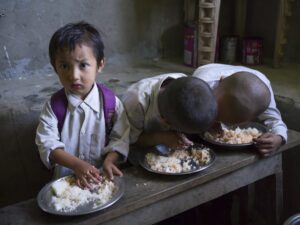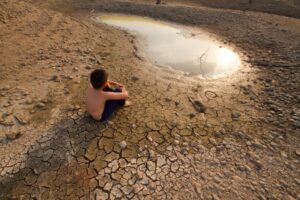
One child loses their caregiver to the pandemic every twelve seconds. This is according to a recent Lancet study which has spotlighted one of the most harrowing effects of the pandemic: ‘COVID orphans’.
“Globally, from March 1, 2020, to April 30, 2021,” the study states, “we estimate 1,134,000 children (95 percent credible interval 884,000–1,185,000) experienced the death of primary caregivers, including at least one parent or custodial grandparent. 1,562,000 children (1,299,000–1,683,000) experienced the death of at least one primary or secondary caregiver.”
This is not the first time the issue of bereavement has been flagged during the pandemic. Health Issues India reported in June of the plight of India’s so-called ‘COVID widows’, left vulnerable following the loss of a spouse to the virus and facing poverty, stigmatisation, and exploitation. For many Indian so-called ‘COVID orphans’, bereavement similarly is not limited to the grief which is distressing enough. The aftershocks are many – as the Lancet report notes “children facing such bereavement are left vulnerable to further consequences, the study notes, such as ‘poverty, abuse, and institutionalisation.”
“For every two COVID-19 deaths worldwide, one child is left behind to face the death of a parent or caregiver,” said Dr Susan Hillis, one of the lead authors on the study, from the U.S. Centers for Disease Control and Prevention COVID-19 Response Team. “By April 30, 2021, these 1.5 million children had become the tragic overlooked consequence of the three million COVID-19 deaths worldwide, and this number will only increase as the pandemic progresses. Our findings highlight the urgent need to prioritise these children and invest in evidence-based programmes and services to protect and support them right now and to continue to support them for many years into the future – because orphanhood does not go away.”

Sadly, the number of COVID orphans is likely to be higher. “Our study establishes minimum estimates—lower bounds—for the numbers of children who lost parents and /or grandparents,” Dr Juliette Unwin, lead author of Imperial College London. “Tragically, many demographic, epidemiological, and healthcare factors suggest that the true numbers affected could be orders of magnitude larger. In the months ahead, variants and the slow pace of vaccination globally threaten to accelerate the pandemic, even in already incredibly hard-hit countries, resulting in millions more children experiencing orphanhood.”
According to the research, India ranks as among the worst-affected countries in terms of the bereavement of children due to the pandemic. “In 21 countries, we estimated that by April 30, 2021, 862,365 children had been orphaned or lost a custodial grandparent due to COVID-19-associated death,” the study found. “Of these, 788,704 children were orphaned of a mother, father, or both, with most losing one parent; 73,661 lost at least one custodial grandparent; and 355,283 lost at least one co-residing grandparent or older kin.
“Countries with the highest numbers of children losing primary caregivers (parents or custodial grandparents) by April were South Africa, Peru, the USA, India, Brazil, and Mexico, with the number of children ranging [from] 94,625 to 141,132.” In light of India’s second wave, the report adds, “the rapid increase in COVID-19-associated deaths from February to April, 2021, was associated with an 8.5-times increase in the number of children orphaned or losing caregivers in April (43,139 more children than [the] March total) compared with March (5,091 more children than [the] February total.”

As The Guardian reported in June, “according to a report of the National Commission for Protection of Child Rights (NCPCR), at least 1,742 [Indian] children have lost both their parents to COVID, while 7,464 have lost one parent. But with the official coronavirus toll…considered to be a vast undercount, it is highly likely the number of COVID orphans is far higher than any records will show.”
India’s ‘COVID orphans’ will receive support, the Government announced in May, through the ‘PM Cares for Children’ initiative. “The PM said that in such trying times it is our duty, as a society, to care for our children and instil hope for a bright future. All children who have lost both parents or [a] surviving parent or legal guardian/adoptive parents due to COVID-19 will be supported under ‘PM-CARES for Children’ scheme,” a statement said. Benefits include an Rs 10 lakh corpus for when they turn eighteen and provisions for their education, as well as enrolment under health insurance scheme Ayushman Bharat.
The Lancet report aptly describes this crisis of bereavement among young people as “a hidden pandemic” and highlights the need for interventions to provide support to children affected and to accelerate efforts to bring the pandemic under control. “Accelerating equitable vaccine delivery is key to prevention,” reads the summarised interpretation. “Psychosocial and economic support can help families to nurture children bereft of caregivers and help to ensure that institutionalisation is avoided. These data show the need for an additional pillar of our response: prevent, detect, respond, and care for children.”
As Professor Lucie Cluver, from Oxford University and the University of Cape Town, stresses, “we need to support extended families or foster families to care for children, with cost-effective economic strengthening, parenting programs, and school access. We need to vaccinate caregivers of children – especially grandparent caregivers. And we need to respond fast because every twelve seconds a child loses their caregiver to COVID-19.”
“Global minimum estimates of children affected by COVID-19-associated orphanhood and deaths of caregivers: a modelling study” can be accessed here.

